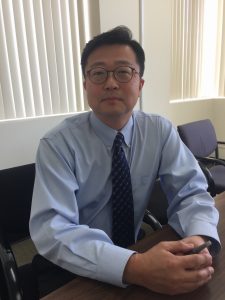 “I am always under pressure as a ‘1.5 generation’ after coming to the United States as an 11-year-old. I’ve wanted to contribute to the Korean-American society as I spoke better English than the first generation while speaking better Korean than the second generation. That’s why I’ve volunteered to become a mediator in the legal field.”
“I am always under pressure as a ‘1.5 generation’ after coming to the United States as an 11-year-old. I’ve wanted to contribute to the Korean-American society as I spoke better English than the first generation while speaking better Korean than the second generation. That’s why I’ve volunteered to become a mediator in the legal field.”
Jeff Lee’s inspiration behind his volunteered work was his yearning to find his best skills 40 years after he moved to the U.S. After learning about the role of a mediator through the Korea Daily’s reporting last September, Lee enrolled in the mediator program at Loyola Law School. He has since began voluntary work as a mediator at Happy Village after completing his studies.
Despite receiving formal education, mediator is not the same as becoming a lawyer. For Lee, it is not even a fulltime job. He still is working for the same company he has been with for the last 25 years and simultaneously serving his mediator role on Saturdays.
“Happy Village was looking for a bilingual volunteer who speaks both Korean and English,” Lee said. “I was that person.”
It is not common for someone who came to the U.S. as an 11-year-old to be reading the Korean newspaper. The reality is that even many of the ones who immigrate to the U.S. after college are not passionate newspaper readers. However, Lee said that he has never stopped reading the Korean newspaper to ensure that his Korean remains sharp. That provided him with a platform to help others who were not as privileged.
The mediation program at Loyola required 40 hours of training. Lee also had to lock in on learning the various legal advices. The dropout rate of the program is high, but a chance to remain as a surviving student motivated him.
“There are many small and big confrontations in the Korean-American community,” Lee said. “Going to the court has almost become common now. It’s much more beneficial to reach a reasonable settlement through mediation unless your intentions are clearly to trick your opposition.”
Koreans only take up 4 percent of the entire L.A. County’s population. Surprisingly, 20 percent of the entire civil lawsuits in the area involve Koreans on both sides. That is why filing a lawsuit for Korean immigrations is often delayed.
For them, mediation is encouraged especially as there are not enough legal interpreters for Koreans at the court. While the rate of two sides in a civil case agreeing to a settlement is only 5 percent, settlement through medication is up to 80 percent. In comparison to fighting a legal battle, mediation is streamlined in process, effective and fair. Many communities in the country are already aware of how inefficient and hurtful a court case could be.
The mediation services offered by Happy Village include the ones between consumer and merchant, small claims, local resident and city government, residential or commercial property lease conflicts and compensation and custody of children for a divorced couple.
Lee admitted that he was oblivious to ideas of helping those in legal conflicts, but is confident that he now has the ability to provide assistance to those in need. Mediation is not something that lawyers can provide and is also not just for the elderly generation.
In his class at Loyola, Lee said that he was the only Korean-American among its 16 students. The other 15 were retired lawyers who was open to the education as they wanted to help others.
Lee encouraged other bilingual Korean-Americans to also join in on an opportunity to help their community. He hopes that the Korean-American community is no longer viewed as the one that is always troubled by conflicts.
▶ Happy Village Mediation Center: 213-368-2679
By Byung Chang





